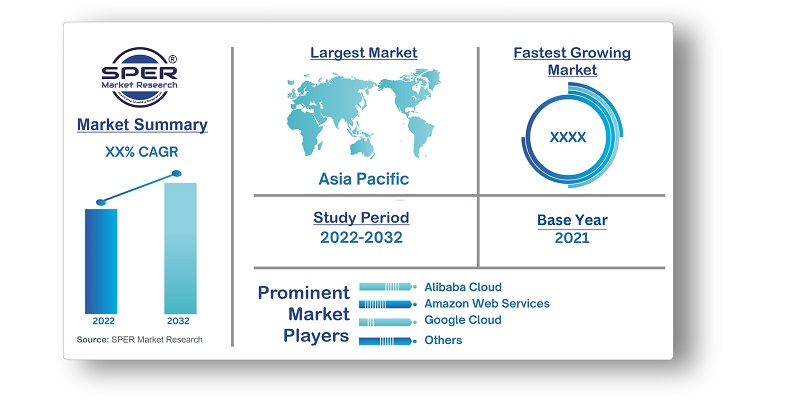
India Data Center and Cloud Services Market Growth, Size, Trends, Revenue, Share and Future Scope
India Data Center and Cloud Services Market Size- By Data Center Industry, By Cloud Industry- Regional Outlook, Competitive Strategies and Segment Forecast to 2032
| Published: Jan-2023 | Report ID: IACT2314 | Pages: 1 - 105 | Formats*: |
| Category : Information & Communications Technology | |||
- NTT India announced the opening of its new hyperscale data center campus, NAV1A, in Navi Mumbai in May 2022. NTT's data center presence in the country now stands at 12 facilities, totaling more than 2.5 million square feet and 220MW of facility power. This launch coincides with the opening of a new data center on its Chandivali site, India's first operational hyperscale data center campus.
- Jun 2022: Equinix Inc., a digital infrastructure business located in the United States, announced an initial investment of more than USD 86 million to build its third International Business Exchange (IBX) data center in Mumbai, dubbed MB3. This initial investment involves the purchase of a block of land totaling approximately four acres, allowing Equinix to continue expanding its ecosystem on Platform Equinix across India, thereby helping the country's booming digital economy.


| Report Metric | Details |
| Market size available for years | 2019-2032 |
| Base year considered | 2021 |
| Forecast period | 2022-2032 |
| Segments covered | By Data Center Industry, By Cloud Industry |
| Regions covered | Bangalore, Chennai, Hyderabad, Mumbai, NCR, Others |
| Companies Covered | Alibaba Cloud, Amazon Web Services, CtrlS, Google Cloud, Microsoft Azure, NTT Communication- Netmagic, NxtGen, Nxtra, Sify Technologies, STT GDC India, Web Werks |
- IT Infrastructure and Operations Professionals
- Data Center Operators and Providers
- Enterprises and Businesses
- Cloud Service Providers (CSPs)
- Telecommunication Companies
- IT Consultants and Service Providers
| By Data Center Industry: |
|
| By Cloud Industry: |
|
| By End Users: |
|
- India Data Center and Cloud Services Market Size (FY’2022-FY’2032)
- Overview of India Data Center and Cloud Services Market
- Segmentation of India Data Center and Cloud Services Market By Data Center Industry (Type of Data Centers, Tier Level, End Users, Clients)
- Segmentation of India Data Center and Cloud Services Market By Cloud Industry (Type of Cloud Services, End Users, Clients)
- Statistical Snap of India Data Center and Cloud Services Market
- Expansion Analysis of India Data Center and Cloud Services Market
- Problems and Obstacles in India Data Center and Cloud Services Market
- Competitive Landscape in the India Data Center and Cloud Services Market
- Impact of COVID-19 and Demonetization on India Data Center and Cloud Services Market
- Details on Current Investment in India Data Center and Cloud Services Market
- Competitive Analysis of India Data Center and Cloud Services Market
- Prominent Players in the India Data Center and Cloud Services Market
- SWOT Analysis of India Data Center and Cloud Services Market
- India Data Center and Cloud Services Market Future Outlook and Projections (FY’2022-FY’2032)
- Recommendations from Analyst
1.1. Scope of the report1.2. Market segment analysis
2.1 Research data source
2.1.1 Secondary data2.1.2 Primary data2.1.3 SPER’s internal database2.1.4 Premium insight from KOL’s
2.2 Market size estimation
2.2.1 Top-down and Bottom-up approach
2.3 Data triangulation
4.1. Driver, Restraint, Opportunity and Challenges analysis
4.1.1 Drivers4.1.2 Restraints4.1.3 Opportunities4.1.4 Challenges
4.2. COVID-19 Impacts of the India Data Center and Cloud Services Market
5.1. SWOT analysis
5.1.1 Strengths5.1.2 Weaknesses5.1.3 Opportunities5.1.4 Threats
5.2. PESTEL analysis
5.2.1 Political landscape5.2.2 Economic landscape5.2.3 Social landscape5.2.4 Technological landscape5.2.5 Environmental landscape5.2.6 Legal landscape
5.3. PORTER’S five forces analysis
5.3.1 Bargaining power of suppliers5.3.2 Bargaining power of Buyers5.3.3 Threat of Substitute5.3.4 Threat of new entrant5.3.5 Competitive rivalry
5.4. Heat map analysis
6.1. India Data Center and Cloud Services Base Distribution, Sales Area, Product Type6.2. Mergers & Acquisitions, Partnerships, Product Launch, and Collaboration in India Data Center and Cloud Services Market
7.1. Type of Data Centers
7.1.1. Co-Location
7.1.1.1. Retail Co-location7.1.1.2. Wholesale Co-location
7.1.2. Managed
7.2. Tier Level
7.2.1. Tier I&II7.2.2. Tier III7.2.3. Tier IV
7.3. End User
7.3.1. IT/ITes7.3.2. BFSI7.3.3. Government7.3.4. Education7.3.5. Retail7.3.6. Manufacturing7.3.7. Logistics7.3.8. Others
7.4. Clients
7.4.1. Domestic Clients7.4.2. Global Clients
8.1. Type of Cloud Services
8.1.1. SaaS8.1.2. IaaS8.1.3. PaaS8.1.4. BpaaS8.1.5. Cloud Managed & Security Service
8.2. End Users
8.2.1. Agriculture8.2.2. Automobile8.2.3. Aviation8.2.4. BFSI8.2.5. Communication & Media8.2.6. E-commerce8.2.7. Government8.2.8. IT/ITes8.2.9. Manufacturing8.2.10. Oil & Gas8.2.11. Retail8.2.12. Telecom8.2.13. Transport & Logistics8.2.14. Others
8.3. Clients
8.3.1. Domestic Clients8.3.2. Global Clients
9.1. India Data Center and Cloud Services Market Size and Market Share by Region (2019-2025)9.2. India Data Center and Cloud Services Market Size and Market Share by Region (2026-2032)9.3. Bangalore9.4. Chennai9.5. Hyderabad9.6. Mumbai9.7. NCR9.8. Others
10.1. Alibaba Cloud
10.1.1. Company details10.1.2. Financial outlook10.1.3. Product summary10.1.4. Recent developments
10.2. Amazon Web Services
10.2.1. Company details10.2.2. Financial outlook10.2.3. Product summary10.2.4. Recent developments
10.3. CtrlS
10.3.1. Company details10.3.2. Financial outlook10.3.3. Product summary10.3.4. Recent developments
10.4. Google Cloud
10.4.1. Company details10.4.2. Financial outlook10.4.3. Product summary10.4.4. Recent developments
10.5. Microsoft Azure
10.5.1. Company details10.5.2. Financial outlook10.5.3. Product summary10.5.4. Recent developments
10.6. NTT Communication- Netmagic
10.6.1. Company details10.6.2. Financial outlook10.6.3. Product summary10.6.4. Recent developments
10.7. NxtGen
10.7.1. Company details10.7.2. Financial outlook10.7.3. Product summary10.7.4. Recent developments
10.8. Nxtra
10.8.1. Company details10.8.2. Financial outlook10.8.3. Product summary10.8.4. Recent developments
10.9. Sify Technologies
10.9.1. Company details10.9.2. Financial outlook10.9.3. Product summary10.9.4. Recent developments
10.10. STT GDC India
10.10.1. Company details10.10.2. Financial outlook10.10.3. Product summary10.10.4. Recent developments
10.11. Web Werks
10.11.1. Company details10.11.2. Financial outlook10.11.3. Product summary10.11.4. Recent developments
SPER Market Research’s methodology uses great emphasis on primary research to ensure that the market intelligence insights are up to date, reliable and accurate. Primary interviews are done with players involved in each phase of a supply chain to analyze the market forecasting. The secondary research method is used to help you fully understand how the future markets and the spending patterns look likes.
The report is based on in-depth qualitative and quantitative analysis of the Product Market. The quantitative analysis involves the application of various projection and sampling techniques. The qualitative analysis involves primary interviews, surveys, and vendor briefings. The data gathered as a result of these processes are validated through experts opinion. Our research methodology entails an ideal mixture of primary and secondary initiatives.



Frequently Asked Questions About This Report
PLACE AN ORDER
Year End Discount
Sample Report
Pre-Purchase Inquiry
NEED CUSTOMIZATION?
Request CustomizationCALL OR EMAIL US
100% Secure Payment






Related Reports
Our Global Clients
Our data-driven insights have influenced the strategy of 200+ reputed companies across the globe.






















